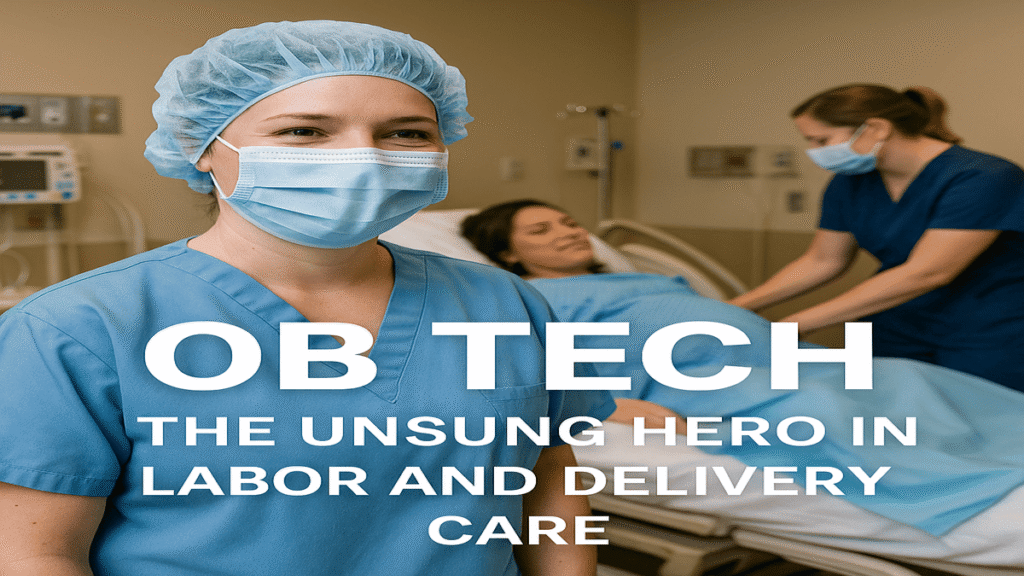Introduction
The field of obstetrics is critical to maternal and newborn health, and behind every successful delivery is a team of skilled professionals. Among them is the OB Tech, or Obstetric Technician—a vital role that ensures the smooth operation of labor and delivery units. Often working behind the scenes, OB techs provide essential support to doctors, nurses, and expectant mothers.
This article explores what OB techs do, their required skills, career outlook, and frequently asked questions to help you better understand this rewarding healthcare profession.
What Is an OB Tech?
An OB Tech (Obstetric Technician) is a healthcare worker trained to assist obstetricians, nurses, and patients in labor and delivery units. They are responsible for preparing delivery rooms, assisting with procedures, maintaining sterilized environments, and offering direct patient care before, during, and after childbirth.
Key Responsibilities of an OB Tech
- Preparing and sterilizing delivery instruments
- Assisting during cesarean sections and vaginal deliveries
- Monitoring supplies and stocking birthing suites
- Transporting patients and equipment
- Supporting nurses and doctors with patient care
- Cleaning and resetting delivery rooms post-procedure
- Providing basic emotional support to patients in labor
OB Techs are instrumental in maintaining an efficient, safe, and compassionate birth environment.
Where Do OB Techs Work?
OB Techs typically work in:
- Hospital labor and delivery departments
- Birthing centers
- Maternity clinics
- Operating rooms during C-sections
Their schedules often include night shifts, weekends, and holidays, as childbirth can occur at any time.
Skills and Qualifications
To become an OB Tech, individuals should have:
- A high school diploma or GED
- Completion of a surgical or patient care technician program (some employers offer on-the-job training)
- Certification in Basic Life Support (BLS) or CPR
- Strong understanding of sterilization procedures and medical terminology
- Excellent interpersonal and organizational skills
Experience as a Certified Nursing Assistant (CNA) or Surgical Technologist is a common path into the OB Tech role.
Career Outlook and Salary
Due to the ongoing need for maternal health services, the demand for OB techs is stable and growing. According to recent healthcare labor data:
- Average salaries range from $30,000 to $50,000 annually, depending on region and experience
- Job growth is expected to continue, especially in hospitals and birth centers with high delivery volumes
- Experienced OB techs may advance into surgical technology or nursing roles with additional education
Why Choose a Career as an OB Tech?
✅ Hands-on Role in Birth Experience
You actively contribute to one of the most important events in a family’s life.
✅ Job Security in a Growing Field
Maternal care is always in demand, offering stable employment.
✅ Opportunity for Career Growth
With further training, OB techs can pursue advanced clinical roles.
✅ Team-Oriented Environment
You work closely with doctors, nurses, and fellow staff members to support mothers and newborns.
Challenges of the Role
Working in labor and delivery can be emotionally and physically intense. OB techs must be prepared for long shifts, emergency situations, and the sensitive nature of childbirth. Compassion, adaptability, and calm under pressure are essential traits.
FAQs About OB Tech Jobs
1. Do OB Techs need a certification?
Certification requirements vary by employer. Some prefer candidates with Certified Surgical Technologist (CST) or Certified Nursing Assistant (CNA) credentials. Others offer on-the-job training for the right candidate.
2. Can OB Techs assist in surgeries?
Yes. OB Techs often assist in cesarean sections, preparing surgical tools, handing instruments to surgeons, and maintaining sterile environments.
3. What is a typical shift like for an OB Tech?
Shifts can range from 8 to 12 hours and may include weekends, holidays, and nights. OB techs must be available around the clock, as deliveries happen 24/7.
4. Is there a demand for OB Techs?
Yes. With ongoing births across the country, labor and delivery departments are always in need of trained support staff like OB techs.
5. How can I become an OB Tech with no experience?
Start with a CNA or medical assisting program. Gain hospital experience in a patient care role and apply for on-the-job training positions in labor and delivery units.
Conclusion
OB Techs may not always be in the spotlight, but they are indispensable in ensuring safe and smooth deliveries. Their blend of technical skills, compassion, and efficiency makes them a key asset to labor and delivery teams. If you’re passionate about healthcare, enjoy hands-on work, and want to make a difference in women’s and newborns’ lives, a career as an OB Tech might be the perfect fit.








